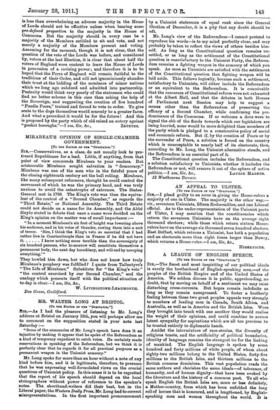MR. WALTER LONG AT BRISTOL.
[TO TER EDITOR 07 TIM "Srxcrsros."1 SIR,—As I had the pleasure of listening to Mr. Long's address at Bristol on January 18th, you will perhaps allow me to comment on the supposition stated in your note last Saturday :— " Some of the summaries of Mr. Long's speech have done it an injustice by making it appear that he spoke of the Referendum as a kind of temporary expedient to catch votes. He certainly made reservations in speaking of the Referendum, but we think it is perfectly clear that he regards it for all practical purposes as a permanent weapon in the Unionist armoury."
Mr. Long spoke for more than an hour without a note of any kind before him, and it is legitimate, therefore, to presume that he was expressing well-formulated views on the crucial questions of Unionist policy. In this sense it is to be regretted that the report of his speech should depend on the local stenographers without power of reference to the speaker's notes. The _shorthand-writers did their best, but in the Liberal paper, the Western Daily Press, Mr. Long had to correct misrepresentations. In the -first important pronouncement
by a Unionist statesman of equal rank since the General Election of December, it is a pity that any doubt should be Left.
Mr. Long's view of the Referendum—I cannot pretend to reproduce his words—is to my mind perfectly clear, and may probably be taken to reflect the views of others besides him- self. As long as the Constitutional question remains un- settled, or as long as the settlement of the Constitutional question is unsatisfactory to the Unionist Party, the Referen- dum remains a fighting weapon in the armoury of which you speak. As soon as Unionists are satisfied with the settlement of the Constitutional question that fighting weapon will be laid aside. This follows logically, because such a settlement, satisfactory to Unionists, will either include the Referendum or an equivalent to the Referendum. It is conceivable that the resources of Constitutional reform were not exhausted at the Albert Hall, and that the debates in both Houses of Parliament next Session may help to suggest a means other than the Referendum of preserving the efficacy of a Second Chamber, while confirming the pre- dominance of the Commons. If so welcome a dove were to signal the ebb of the floods towards which our legislators are being hurried, none would be more delighted than members of the party which is pledged to a constructive policy of social and economic reform. But if, by the creation of Peers or by the surrender of Peers, a solution is forced on the country which is unacceptable to nearly half of its electorate, then, according to Mr. Long, the Unionist alternative stands, and the Referendum is an essential part of it.
The Constitutional question includes the Referendum, and a solution satisfactory to Unionists, whether it includes the Referendum or not, will remove it out of the sphere of active






















































 Previous page
Previous page